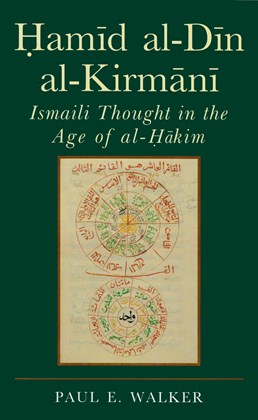Ḥamīd al-Dīn al-Kirmānī Ismaili Muslim Thought in the Age of al-Ḥākim bi-Amr Allah
I.B. Tauris in association with the Institute of Ismaili Studies
A major Ismaili Muslim scholar and writer who flourished during the first half of the eleventh century AD, Ḥamīd al-Dīn al-Kirmānī possessed a profoundly creative mind, which allowed him to master the theological, philosophical and scientific discourse of his time and to integrate this learning in numerous influential treatises on Ismaili thought. His knowledge and scholarship were on a par with the best of his contemporaries, including the philosopher Ibn Sina (Avicenna), with whom he shared a common scientific outlook. Al-Kirmānī’s career and achievements are inextricably linked to the charismatic Fatimid Ismaili caliph-imam al-Ḥākim bi-Amr Allāh (386–411/996–1021), whose personality and politics remain enigmatic to this day. Al-Kirmānī was already a leading figure of the Ismaili da‘wa (religious organisation) in Iraq and Iran, and the author of several major works, when he was summoned to the Fatirnid capital of Cairo in order to address serious dissension there on theoretical issues of doctrine, which threatened to undermine the da‘wa in the final years of al-Ḥākim’s reign.
Paul E. Walker, an authority on Fatimid Ismaili history and thought, here provides the first systematic account in English of the life, works and accomplishments of al-Kirmānī. Particularly valuable is his penetrating analysis of the intellectual debates and arguments that arose in the Ismaili community and of their significance in the wider context of general Ismaili thought, at a time when the Fatimid state was at the height of its glory and influence in the Muslim world.
Preface
1. The Imam and the Daʿi
2. The Works of al-Kirmani
3. Al-Kirmani and the Daʿwa
4. Double Observance by Works and Knowledge
5. God, Creation and the Cosmic Order
6. The City of God
Appendix A: Al-Kirmani and the Philosophers
Appendix B: Al-Kirmani's Citations of His Own Works
Appendix C: The Author’s Table of Contents for the Rāḥat al-ʿaql
Notes
Bibliography
Index
‘....a fascinating and thoroughly engrossing book...’
– Dialogue
Paul E. Walker is an historian of ideas, currently affiliated with the University of Chicago. He has published numerous books on Fatimid history and Ismaili thought in its formative period, including Early Philosophical Shiism, An Ismaili Heresiography with Wilferd Madelung, The Wellsprings of Wisdom and Abū Ya‘qūb al-Sijistānī: Intellectual Missionary (I.B. Tauris).

